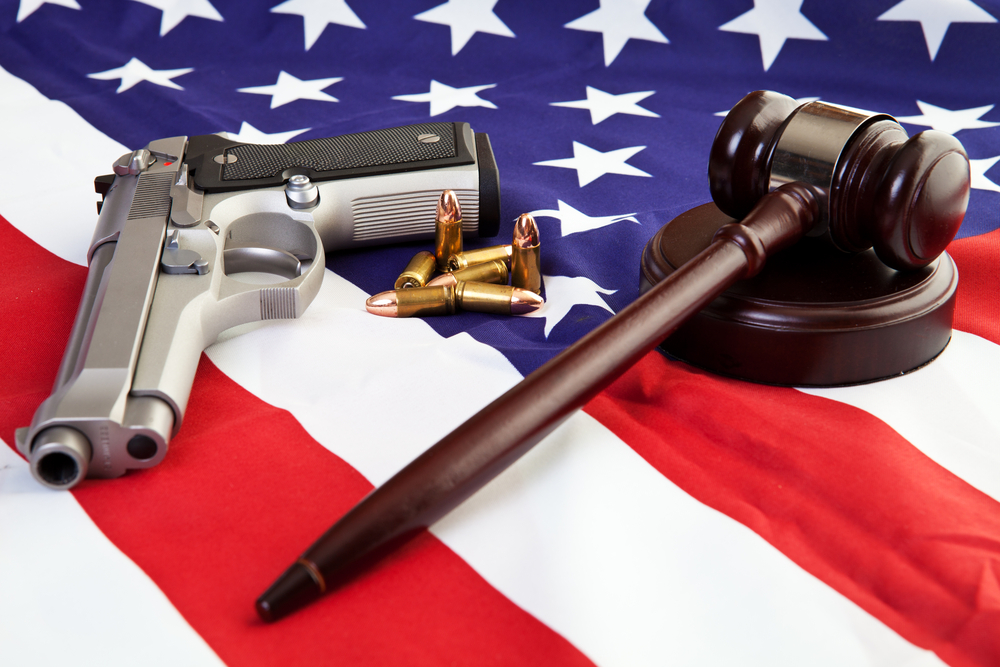
By Irene Anastasiadis
Boston University News Service
Gov. Maura Healey signed an emergency preamble on Oct. 2, expediting the implementation of the new gun legislation passed earlier this summer.
In July, Healey signed what has been called the most consequential gun legislation Massachusetts has seen in the past decade: An Act Modernizing Firearms Laws. The bill helps eliminate ghost guns, which are homemade weapons with no serial number and are untraceable by law enforcement. The law requires an electronic firearms registration system to be developed and for all manufactured firearms to be registered.
According to Mass.gov, this legislation improves the “state’s firearm registration, licensing and possession laws, as well as enhancing firearm data collection, analysis and publication.”
22-year-old Caroline Spire, an advertising major at Boston University from Pennsylvania, said that she feels safer on campus with stricter gun legislation.
“As a student in the past four years or so, I always figured that gun violence on campus was just an inevitable rather than a what-if situation,” Spire said.
Spire also said that expediting this law does make her feel safer going to campus. She said she doesn’t have to go to campus assuming that at some point there will be a lockdown and that she will be in lethal danger.
According to the Commonwealth of Massachusetts glossary, an emergency preamble to a legislative document states that “the law is necessary to take effect immediately for the preservation of the public peace, health, safety or convenience.”
When Healey signed this new legislation, gun rights advocates wanted to suspend it by gathering enough signatures before it took effect, but Healey’s emergency preamble stopped that from happening.
34-year-old Vinny Sudre, owner of SDW LLC firearms store in Easton, Massachusetts, said he’s not pleased with the new legislation. Sudre said he has lost 80% of his customers since the emergency preamble in October. His sales have decreased and this week he is paying to be open.
“I got to jump through more hoops just to make a sale,” Sudre said. He said that the bill isn’t clear to him regarding what he can sell or do and asserted that his customers are also confused by this law.
“Right now I’m stuck selling revolvers and pistols because that’s the only clear thing I can still sell,” Sudre said.
Sudre said that automatic shotguns for hunting are hard to sell. “It is banned, you can’t buy a semi-automatic shotgun. It’s ridiculous. You can’t even practice your Second Amendment,” Sudre said.
When asked if ghost guns and 3D guns are a problem in the state, Sudre said no. The people who create ghost guns will still find a way to obtain a gun, Sudre said. He compared it to illegal drugs that are still accessible to people; a criminal will find access to a gun just the same way.
Cody Jacobs, a lecturer at the Lawyering Program at BU’s School of Law, said what gun rights activists will do to try and overturn the legislation: file lawsuits based on the Second Amendment and gather signatures to get a measure on the 2026 ballot to repeal it. Jacobs told said that he thinks both are not likely to succeed.
“I think [gun rights activists] are going to have a real uphill battle,” Jacobs said about their likelihood of successfully repealing the law or part of it.
This legislation improves training requirements for a concealed carry license (LTC). It ensures, under the “Red Flag Law,” that a person who loses their firearm license cannot get a new one while their “Extreme Risk Protection Order” is still in place. According to Mass.gov, the law criminalizes the possession of a firearm in public spaces such as government buildings, courts and polling areas.
The legislation broadens the definition of assault weapons, restricts the license to carry a machine gun to the majority of people and criminalizes the ownership of new parts added to a weapon making them more dangerous.
Jacobs said the new legislation isn’t as groundbreaking as we may think. Still, the law does steer the state in an “incrementally better direction.”
If anything, Jacobs said assault weapons bans are not in the clear considering the country has “a very conservative Supreme Court that’s very pro-gun and looking to strike down some of these laws.”
The 2022 Supreme Court ruling in New York struck down the law restricting a license to carry a gun and declared it unconstitutional to do so. This decision influenced Healey’s gun legislation, putting more restrictions and training in place for obtaining a concealed carry license.
However, Sudre opposes the increased training requirements for an LTC. “The Second Amendment doesn’t say that you need training,” he said. He said he believes in the right for people to protect themselves and buy what they want to make that happen.
“You can’t protect your family,” Sudre said about stricter gun laws and this bill in particular.
The discourse around gun control varies, and there is a divide between lawmakers and gun rights activists. On top of that, there are misinterpretations of the law, the causes of gun violence and how to establish public safety.
Gun control is not a new topic; it has been debated since the Constitution was written and is still a constant legal battle nationwide. Gun owners are dedicated advocates for protecting themselves while the state is passing various laws hoping to achieve the same goal – protecting their citizens.
“I think that Massachusetts voters pretty strongly approve of our gun laws,” Jacobs said. “The fact that we have one of the lower gun death rates in the country is a testament to the success of our gun laws, I think Mass voters will want to continue that.”
Massachusetts residents are not avid gun owners, which is reflected in the state’s gun ownership statistics in 2024. Massachusetts and New Jersey are the two states tied with the lowest percentage (14.7%) of gun owners in 2024, according to the World Population Review.
Compared to its population of approximately seven million people, Massachusetts has a small portion of gun owners. Approximately 540,000 residents have an LTC in Massachusetts, according to a 2024 Active FIrearm License Excel sheet from Mass.gov.
The percentage of Americans wanting stricter gun laws has varied throughout the last 30 years. Still, according to the analytics company Gallup, 57% of Americans prefer more stringent gun laws as of 2022, compared to 10% that prefer less strict (looser) gun laws.
Regardless of the gun owner statistics, there are gun store owners, like Sudre, who believe stricter legislation is not the answer to a safer environment. However, government data confirms that the citizens of states with loose gun laws (no assault weapons ban, open carry, prohibiting gun registration, etc) suffer the most due to senseless loss of life compared to those in states that have strict gun laws.




